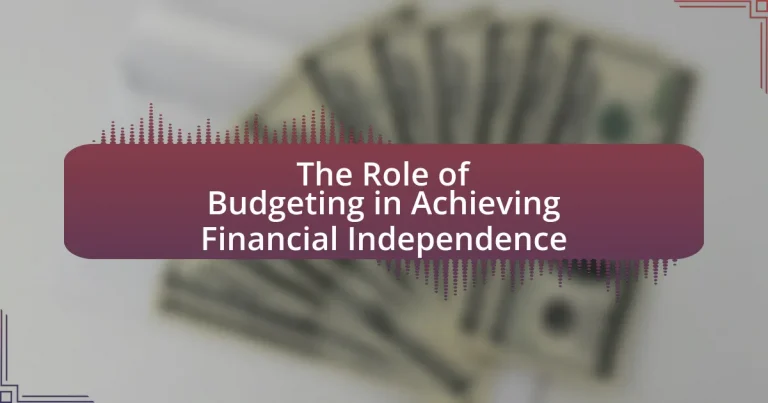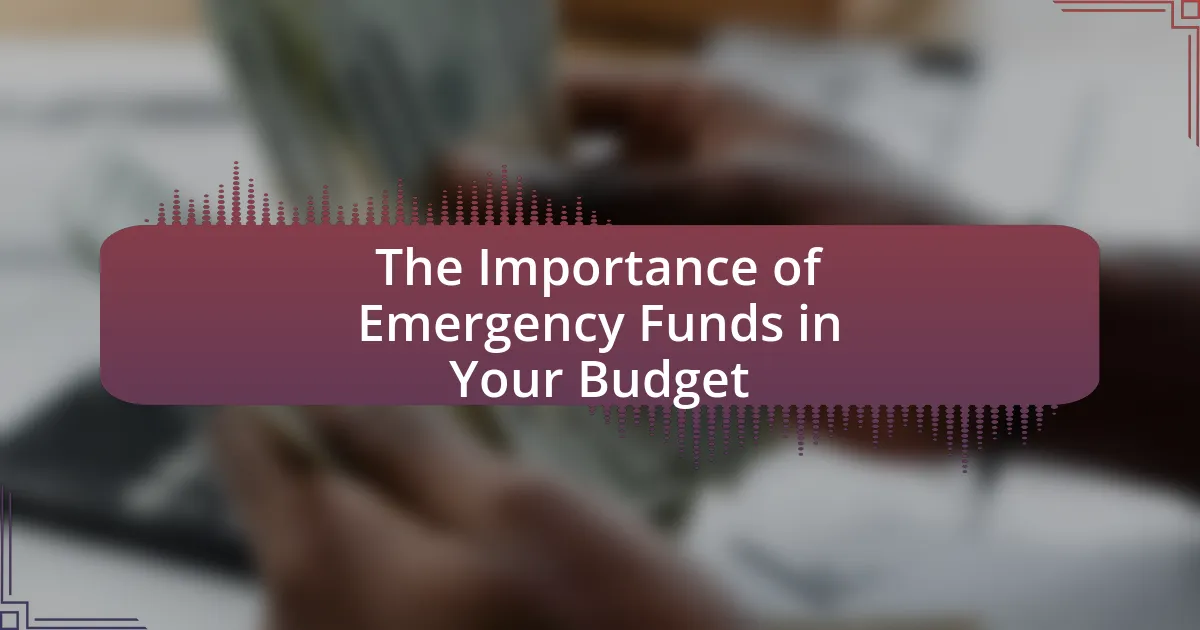The article focuses on the critical role of budgeting in achieving financial independence. It outlines how budgeting provides a structured plan for income allocation and expense management, enabling individuals to track spending, prioritize savings, and make informed financial decisions. Key principles of effective budgeting, various budgeting methods, and their long-term benefits are discussed, along with common challenges individuals face in budgeting. The article emphasizes the importance of budgeting for financial planning and highlights strategies to enhance budgeting effectiveness, including the use of technology and best practices for maintaining a budget.

What is the Role of Budgeting in Achieving Financial Independence?
Budgeting plays a crucial role in achieving financial independence by providing a structured plan for income allocation and expense management. This structured approach enables individuals to track their spending, prioritize savings, and identify areas for financial improvement. According to a study by the National Endowment for Financial Education, individuals who budget are more likely to save money and achieve their financial goals, as they can make informed decisions about their finances. By adhering to a budget, individuals can systematically build wealth, reduce debt, and ultimately attain financial independence.
How does budgeting contribute to financial independence?
Budgeting contributes to financial independence by enabling individuals to track their income and expenses, allowing for informed financial decisions. By creating a budget, individuals can allocate funds towards savings and investments, which are essential for building wealth over time. Research indicates that individuals who budget regularly are more likely to save effectively; a study by the National Endowment for Financial Education found that 70% of those who budget report feeling more in control of their finances. This control facilitates the ability to reduce debt and increase savings, both critical components of achieving financial independence.
What are the key principles of effective budgeting?
The key principles of effective budgeting include setting clear financial goals, tracking income and expenses, prioritizing spending, and regularly reviewing and adjusting the budget. Setting clear financial goals provides direction and motivation, while tracking income and expenses ensures awareness of financial status. Prioritizing spending helps allocate resources to essential needs and savings, and regular reviews allow for adjustments based on changing circumstances. These principles are supported by financial management studies, which indicate that individuals who adhere to structured budgeting practices are more likely to achieve financial stability and independence.
How does budgeting help in tracking expenses?
Budgeting helps in tracking expenses by providing a structured framework that categorizes and limits spending. This systematic approach allows individuals to monitor their financial activities against predefined limits, making it easier to identify areas of overspending. For instance, a study by the National Endowment for Financial Education found that individuals who maintain a budget are 20% more likely to feel in control of their finances compared to those who do not budget. By regularly reviewing budgeted amounts versus actual expenditures, individuals can adjust their spending habits, ultimately leading to better financial management and progress towards financial independence.
Why is budgeting essential for financial planning?
Budgeting is essential for financial planning because it provides a structured approach to managing income and expenses, enabling individuals to allocate resources effectively. By creating a budget, individuals can identify their financial goals, track spending habits, and prioritize savings, which are critical components of achieving financial independence. Research indicates that individuals who budget are more likely to save money and reduce debt, as they gain a clearer understanding of their financial situation and can make informed decisions. For instance, a study by the National Endowment for Financial Education found that budgeting significantly improves financial literacy and overall financial well-being.
What are the long-term benefits of maintaining a budget?
Maintaining a budget provides long-term benefits such as improved financial stability, enhanced savings, and better debt management. Financial stability is achieved through consistent tracking of income and expenses, which allows individuals to make informed decisions and avoid overspending. Enhanced savings occur as budgeting encourages setting aside funds for emergencies and future goals, leading to a more secure financial future. Better debt management results from prioritizing payments and reducing unnecessary expenditures, ultimately leading to lower interest costs and improved credit scores. According to a study by the National Endowment for Financial Education, individuals who budget are more likely to save and invest effectively, reinforcing the positive impact of budgeting on long-term financial health.
How does budgeting influence saving habits?
Budgeting significantly influences saving habits by providing a structured framework for individuals to allocate their income towards savings goals. When individuals create a budget, they identify their income sources and categorize their expenses, which allows them to see how much money is available for saving after necessary expenditures. Research indicates that individuals who budget are more likely to save consistently; a study by the National Endowment for Financial Education found that 70% of people who budget report having savings compared to only 30% of those who do not budget. This structured approach not only encourages regular saving but also helps individuals prioritize their financial goals, leading to improved financial stability and independence.

What are the different budgeting methods available?
The different budgeting methods available include zero-based budgeting, incremental budgeting, and the envelope system. Zero-based budgeting requires every expense to be justified for each new period, ensuring that all funds are allocated based on current needs rather than historical spending. Incremental budgeting adjusts previous budgets based on new data, often leading to less scrutiny of expenses. The envelope system involves allocating cash for specific categories of spending, promoting discipline in managing finances. Each method serves distinct purposes and can be effective in achieving financial independence by fostering better control over personal finances.
How do various budgeting techniques work?
Various budgeting techniques work by providing structured methods for individuals to allocate their income towards expenses, savings, and investments. For instance, the zero-based budgeting technique requires individuals to assign every dollar of income to specific expenses or savings goals, ensuring that income minus expenses equals zero at the end of the month. This method promotes awareness of spending habits and encourages prioritization of essential expenses.
Another technique, the 50/30/20 rule, divides income into three categories: 50% for needs, 30% for wants, and 20% for savings and debt repayment. This approach simplifies budgeting by providing clear guidelines on how to balance spending and saving.
The envelope system involves allocating cash for different spending categories into envelopes, which helps individuals physically see their spending limits and avoid overspending. This tactile method reinforces discipline in managing finances.
Lastly, the incremental budgeting technique adjusts previous budgets based on changes in income or expenses, allowing for flexibility while maintaining a baseline for financial planning. Each of these techniques serves to enhance financial awareness and control, ultimately contributing to the goal of financial independence.
What is the zero-based budgeting method?
The zero-based budgeting method is a financial planning approach where every dollar of income is allocated to specific expenses, savings, or debt repayment, resulting in a budget that starts from a “zero base.” This method requires individuals or organizations to justify each expense for the upcoming period, ensuring that all expenditures are necessary and aligned with financial goals. According to a study by the Financial Planning Association, zero-based budgeting can enhance financial discipline and improve resource allocation, making it a valuable tool for achieving financial independence.
How does the 50/30/20 rule function?
The 50/30/20 rule functions by allocating an individual’s after-tax income into three distinct categories: 50% for needs, 30% for wants, and 20% for savings and debt repayment. This budgeting framework helps individuals prioritize essential expenses, discretionary spending, and financial goals, promoting a balanced approach to personal finance. The rule is widely endorsed by financial experts, as it simplifies budgeting and encourages responsible financial habits, ultimately aiding in the pursuit of financial independence.
Which budgeting method is best for achieving financial independence?
The best budgeting method for achieving financial independence is the zero-based budgeting approach. This method requires individuals to allocate every dollar of their income to specific expenses, savings, or debt repayment, ensuring that income minus expenses equals zero. Research indicates that zero-based budgeting promotes financial discipline and awareness, which are crucial for building wealth and achieving financial independence. A study by the National Endowment for Financial Education found that individuals who actively manage their budgets are more likely to save and invest effectively, leading to greater financial stability and independence over time.
What factors should be considered when choosing a budgeting method?
When choosing a budgeting method, individuals should consider their financial goals, income stability, spending habits, and the complexity of the budgeting system. Financial goals define what the individual aims to achieve, such as saving for retirement or paying off debt. Income stability affects how predictable cash flow is, influencing the choice between flexible or fixed budgeting methods. Spending habits provide insight into whether a detailed or simplified approach is more suitable. Lastly, the complexity of the budgeting system should match the individual’s comfort level with financial management; simpler methods may be more effective for those less experienced with budgeting.
How can personal circumstances affect budgeting choices?
Personal circumstances significantly influence budgeting choices by determining income levels, expenses, and financial priorities. For instance, individuals with dependents may allocate more funds toward childcare and education, while those facing medical issues might prioritize health-related expenses. According to a report by the Bureau of Labor Statistics, households with children spend approximately 25% more on average than those without, highlighting how family structure impacts budgeting. Additionally, job stability and income fluctuations can lead to adjustments in spending habits, as individuals may need to cut discretionary expenses during periods of financial uncertainty. Thus, personal circumstances shape the financial landscape, directly affecting how individuals approach budgeting.

What challenges do individuals face in budgeting for financial independence?
Individuals face several challenges in budgeting for financial independence, including inconsistent income, unexpected expenses, and lack of financial literacy. Inconsistent income, often seen in freelance or gig work, makes it difficult to predict monthly cash flow, complicating budgeting efforts. Unexpected expenses, such as medical emergencies or car repairs, can derail even the most carefully planned budgets, leading to financial stress. Additionally, a lack of financial literacy can hinder individuals from effectively creating and managing a budget, as they may not fully understand concepts like savings rates, investment options, or debt management strategies. These challenges collectively impede the ability to allocate resources efficiently towards achieving financial independence.
How can common budgeting pitfalls be avoided?
Common budgeting pitfalls can be avoided by implementing a realistic and detailed budgeting plan that accounts for all income and expenses. This involves tracking spending habits meticulously, setting specific financial goals, and regularly reviewing and adjusting the budget as necessary. Research indicates that individuals who use detailed budgeting methods are 50% more likely to stick to their financial plans, as they can identify areas of overspending and make informed adjustments. Additionally, utilizing budgeting tools or apps can enhance accountability and provide insights into spending patterns, further reducing the likelihood of common pitfalls such as underestimating expenses or failing to save for emergencies.
What are the most frequent mistakes made in budgeting?
The most frequent mistakes made in budgeting include underestimating expenses, failing to track spending, and not adjusting the budget regularly. Underestimating expenses often leads to financial shortfalls, as individuals may overlook variable costs such as utilities or groceries, which can fluctuate. Failing to track spending results in a lack of awareness about where money is going, making it difficult to identify areas for savings. Not adjusting the budget regularly can cause it to become outdated, as life circumstances change, such as income fluctuations or unexpected expenses. These mistakes can hinder financial independence by preventing effective financial planning and management.
How can emotional spending impact budgeting efforts?
Emotional spending can significantly undermine budgeting efforts by leading individuals to make impulsive purchases that deviate from their financial plans. This behavior often results in overspending, which can create budget shortfalls and hinder the ability to save for long-term financial goals. Research indicates that approximately 60% of consumers engage in emotional spending, often as a coping mechanism for stress or negative emotions, which can disrupt financial stability and planning. By prioritizing immediate gratification over long-term financial health, emotional spending can create a cycle of debt and financial insecurity, ultimately obstructing the path to financial independence.
What strategies can enhance budgeting effectiveness?
Implementing a zero-based budgeting strategy can significantly enhance budgeting effectiveness. This approach requires individuals to justify every expense, ensuring that all spending aligns with their financial goals and priorities. Research from the Journal of Financial Planning indicates that zero-based budgeting can lead to a more disciplined financial management process, as it encourages individuals to critically evaluate their spending habits and eliminate unnecessary expenses. Additionally, utilizing budgeting software can streamline the tracking of income and expenses, providing real-time insights that facilitate informed financial decisions. According to a study by the National Endowment for Financial Education, individuals who use budgeting tools are more likely to stick to their budgets and achieve their financial objectives.
How can technology assist in budgeting?
Technology assists in budgeting by providing tools that automate expense tracking, enhance financial analysis, and facilitate real-time budget adjustments. Applications like Mint and YNAB (You Need A Budget) allow users to categorize spending, set financial goals, and receive alerts for overspending, which can lead to more informed financial decisions. According to a study by the National Endowment for Financial Education, individuals who use budgeting apps report a 20% increase in their ability to stick to a budget, demonstrating the effectiveness of technology in promoting financial discipline.
What are some best practices for maintaining a budget?
To maintain a budget effectively, individuals should track all income and expenses meticulously. This practice allows for a clear understanding of financial inflows and outflows, enabling better decision-making. Regularly reviewing and adjusting the budget ensures it reflects current financial situations and goals, which is crucial for long-term financial independence. Additionally, setting specific financial goals, such as saving for emergencies or retirement, provides motivation and direction. Research indicates that individuals who set clear financial goals are more likely to achieve them, as they create a roadmap for their spending and saving habits.
What practical tips can help achieve financial independence through budgeting?
To achieve financial independence through budgeting, individuals should create a detailed budget that tracks income and expenses. This practice allows for better financial awareness and control, enabling individuals to identify areas where they can cut costs and save more effectively. Research indicates that people who maintain a budget are 30% more likely to achieve their financial goals compared to those who do not budget. Additionally, setting specific savings goals within the budget can motivate individuals to prioritize saving over unnecessary spending, further enhancing their path to financial independence.





